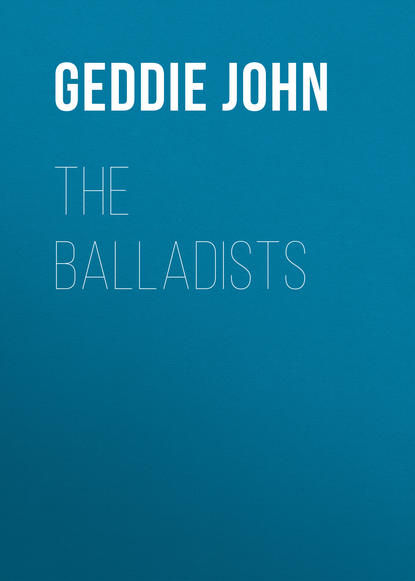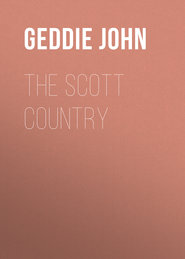По всем вопросам обращайтесь на: info@litportal.ru
(©) 2003-2024.
✖
The Balladists
Настройки чтения
Размер шрифта
Высота строк
Поля
and there is no room in his narrow house for other company. Out of the Dark Country, too, on a similar errand, on Hallowe'en night, rides the betrayed and slain knight in Child Rowland, the first line of which, preserved in King Lear as it was known in Shakespeare's day, seems to strike a keynote of ballad romance:
'Child Rowland to the dark tower came,'
mumbles the feigned madman in the ear of the poor wronged king as they tread the waste heath. And the sequel, as it has come down to us, sustains and strengthens the spell of the opening:
'And he tirled at the pin;
And wha sae ready as his fause love,
To rise and let him in.'
The passages that describe the haunted ride in the moonlight, when the lady has fled from the scene of her treachery and guilt, are not surpassed in weird imaginative power, if they are equalled, by anything in ballad or other literature:
'She hadna ridden a mile, a mile,
Never a mile but ane,
When she was 'ware o' a tall young man
Riding slowly o'er the plain.
She turned her to the right about,
And to the left turned she;
But aye 'tween her and the wan moonlight
That tall knight did she see.'
She set whip and spur to her steed, but 'nae nearer could she get'; she appealed to him, as from a 'saikless,' or guiltless, maid to 'a leal true knight,' to draw his bridle-rein until she can come up with him:
'But nothing did that tall knight say,
And nothing did he blin;
Still slowly rade he on before,
And fast she rade behind,'
until he drew rein at a broad river-side. Then he spoke:
'"This water it is deep," he said,
"As it is wondrous dun;
But it is sic as a saikless maid,
And a leal true knight can swim."'
They plunged in together, and the flood bore them down:
'"The water is waxing deeper still,
Sae does it wax mair wide;
And aye the farther we ride on,
Farther off is the other side."
· · · · ·
The knight turned slowly round about
All in the middle stream,
He stretched out his hand to that lady,
And loudly she did scream.
"O, this is Hallow-morn," he said,
"And it is your bridal day;
But sad would be that gay wedding
Were bridegroom and bride away.
But ride on, ride on, proud Margaret,
Till the water comes o'er your bree;
For the bride maun ride deep and deeper yet
Who rides this ford wi' me."'
But the perturbed spirit does not always thus revisit the glimpses of the moon to awaken conscience, to humble pride, or to wreak vengeance. More often it is the repinings and longings of passionate love that keep it from its rest. In märchen and ballad the ghost of the lover comes to complain that the tears which his betrothed sheds nightly fill his shroud with blood; when she smiles, it is filled with rose leaves. The mother steals from the grave to hap and comfort her orphan children; their harsh stepmother neglects and ill-treats them, and their exceeding bitter and desolate cry has penetrated beneath the sod, and reached the dead ear. In The Clerk's Sons o' Owsenford, and in that singular fragment of the same creepy theme, recovered by Scott, The Wife of Usher's Well, it is the yearning of the living mother that brings the dead sons back to their home:
'"Blaw up the fire, my maidens,
Bring water from the well!
For a' my house shall feast this nicht,
Since my three sons are well."'
The revenants, silent guests with staring eyes, wait and warm themselves by the fireside, while the 'carline wife' ministers to their wants, and spreads her 'gay mantle' over them to keep them from the cold, until their time comes:
'"The cock doth craw, the day doth daw,
The channerin' worm doth chide;
Gin we be missed out o' our place
A sair pain we must bide."
"Lie still, be still a little wee while,
Lie still but if we may;
Gin my mother should miss us when she wakes,
She 'll gae mad, ere it be day."
O it 's they 've taen up their mother's mantle,
And they 've hung it on a pin;
"O lang may ye hing, my mother's mantle,
Ere ye hap us again."'
A chill air as from the charnel-house seems to breathe upon us while reading the lines; the coldness, the darkness, and the horror of death have never been painted for us with more terrible power than in the 'Wiertz Gallery' of the old balladists.
We feel this also in the ballads of the type of Sweet William and May Margaret, quoted in Beaumont and Fletcher's Knight of the Burning Pestle, where the dead returns to claim back a plighted word; and at the same time we feel the strength of the perfect love that triumphs over death and casts out fear:
'"Is there any room at your head, Willie,
Or any room at your feet,
Or any room at your side, Willie,
Wherein that I may creep?"'
How miserably the poetical taste of the early part of last century misappreciated the spirit of the ancient ballad, preferring the dross to the fine gold, and tricking out the 'terrific old Scottish tale,' as Sir Walter Scott calls it, in meretricious ornament, may be seen by comparing the original copies with that 'elegant' composition of David Mallet, William and Margaret, so praised and popular in its day, in which every change made is a disfigurement of the nature of an outrage. Read the summons of the ghost, still 'naked of ornament and simple':
'"O sweet Marg'ret, O dear Marg'ret!
I pray thee speak to me;
Gie me my faith and troth, Marg'ret,
As I gae it to thee,"'
along with the 'improved' version:
'Child Rowland to the dark tower came,'
mumbles the feigned madman in the ear of the poor wronged king as they tread the waste heath. And the sequel, as it has come down to us, sustains and strengthens the spell of the opening:
'And he tirled at the pin;
And wha sae ready as his fause love,
To rise and let him in.'
The passages that describe the haunted ride in the moonlight, when the lady has fled from the scene of her treachery and guilt, are not surpassed in weird imaginative power, if they are equalled, by anything in ballad or other literature:
'She hadna ridden a mile, a mile,
Never a mile but ane,
When she was 'ware o' a tall young man
Riding slowly o'er the plain.
She turned her to the right about,
And to the left turned she;
But aye 'tween her and the wan moonlight
That tall knight did she see.'
She set whip and spur to her steed, but 'nae nearer could she get'; she appealed to him, as from a 'saikless,' or guiltless, maid to 'a leal true knight,' to draw his bridle-rein until she can come up with him:
'But nothing did that tall knight say,
And nothing did he blin;
Still slowly rade he on before,
And fast she rade behind,'
until he drew rein at a broad river-side. Then he spoke:
'"This water it is deep," he said,
"As it is wondrous dun;
But it is sic as a saikless maid,
And a leal true knight can swim."'
They plunged in together, and the flood bore them down:
'"The water is waxing deeper still,
Sae does it wax mair wide;
And aye the farther we ride on,
Farther off is the other side."
· · · · ·
The knight turned slowly round about
All in the middle stream,
He stretched out his hand to that lady,
And loudly she did scream.
"O, this is Hallow-morn," he said,
"And it is your bridal day;
But sad would be that gay wedding
Were bridegroom and bride away.
But ride on, ride on, proud Margaret,
Till the water comes o'er your bree;
For the bride maun ride deep and deeper yet
Who rides this ford wi' me."'
But the perturbed spirit does not always thus revisit the glimpses of the moon to awaken conscience, to humble pride, or to wreak vengeance. More often it is the repinings and longings of passionate love that keep it from its rest. In märchen and ballad the ghost of the lover comes to complain that the tears which his betrothed sheds nightly fill his shroud with blood; when she smiles, it is filled with rose leaves. The mother steals from the grave to hap and comfort her orphan children; their harsh stepmother neglects and ill-treats them, and their exceeding bitter and desolate cry has penetrated beneath the sod, and reached the dead ear. In The Clerk's Sons o' Owsenford, and in that singular fragment of the same creepy theme, recovered by Scott, The Wife of Usher's Well, it is the yearning of the living mother that brings the dead sons back to their home:
'"Blaw up the fire, my maidens,
Bring water from the well!
For a' my house shall feast this nicht,
Since my three sons are well."'
The revenants, silent guests with staring eyes, wait and warm themselves by the fireside, while the 'carline wife' ministers to their wants, and spreads her 'gay mantle' over them to keep them from the cold, until their time comes:
'"The cock doth craw, the day doth daw,
The channerin' worm doth chide;
Gin we be missed out o' our place
A sair pain we must bide."
"Lie still, be still a little wee while,
Lie still but if we may;
Gin my mother should miss us when she wakes,
She 'll gae mad, ere it be day."
O it 's they 've taen up their mother's mantle,
And they 've hung it on a pin;
"O lang may ye hing, my mother's mantle,
Ere ye hap us again."'
A chill air as from the charnel-house seems to breathe upon us while reading the lines; the coldness, the darkness, and the horror of death have never been painted for us with more terrible power than in the 'Wiertz Gallery' of the old balladists.
We feel this also in the ballads of the type of Sweet William and May Margaret, quoted in Beaumont and Fletcher's Knight of the Burning Pestle, where the dead returns to claim back a plighted word; and at the same time we feel the strength of the perfect love that triumphs over death and casts out fear:
'"Is there any room at your head, Willie,
Or any room at your feet,
Or any room at your side, Willie,
Wherein that I may creep?"'
How miserably the poetical taste of the early part of last century misappreciated the spirit of the ancient ballad, preferring the dross to the fine gold, and tricking out the 'terrific old Scottish tale,' as Sir Walter Scott calls it, in meretricious ornament, may be seen by comparing the original copies with that 'elegant' composition of David Mallet, William and Margaret, so praised and popular in its day, in which every change made is a disfigurement of the nature of an outrage. Read the summons of the ghost, still 'naked of ornament and simple':
'"O sweet Marg'ret, O dear Marg'ret!
I pray thee speak to me;
Gie me my faith and troth, Marg'ret,
As I gae it to thee,"'
along with the 'improved' version:






